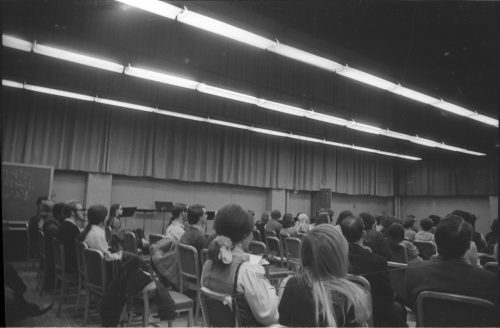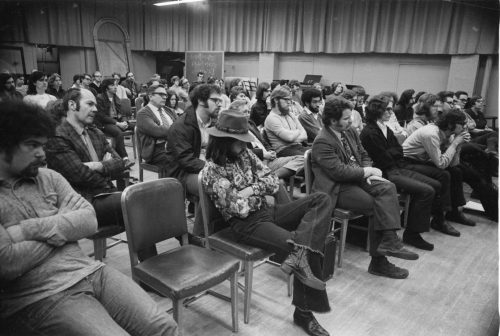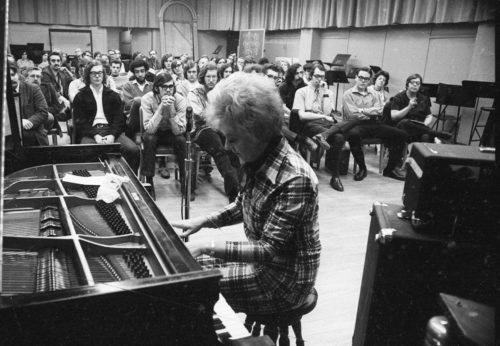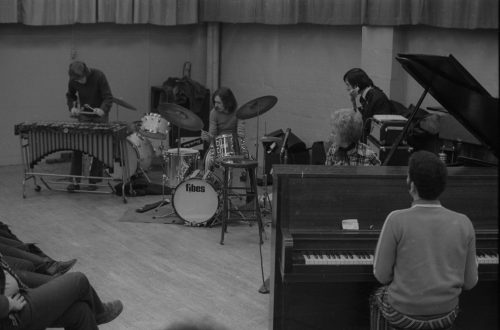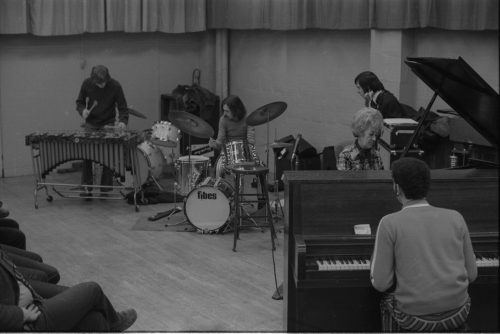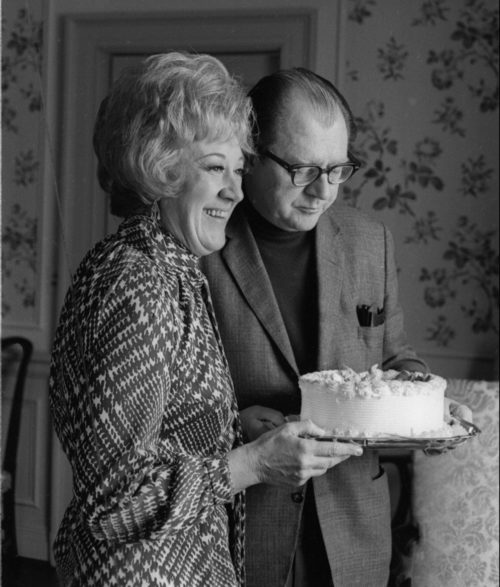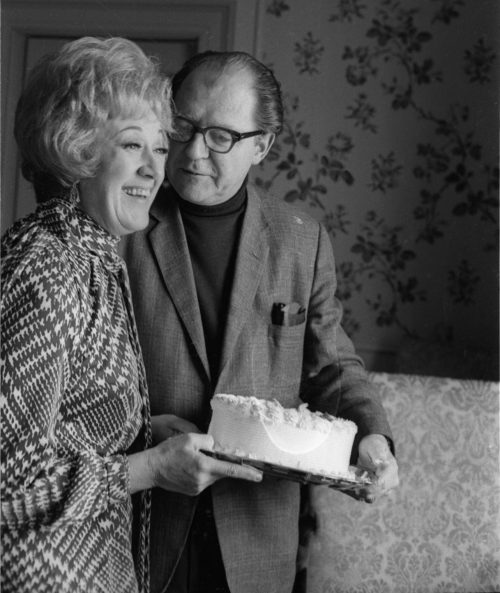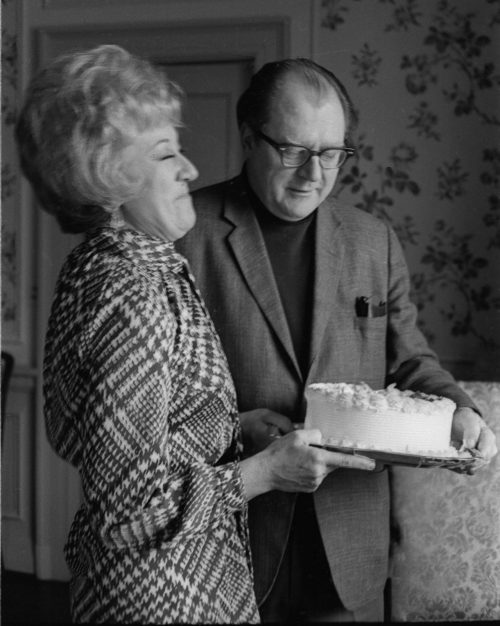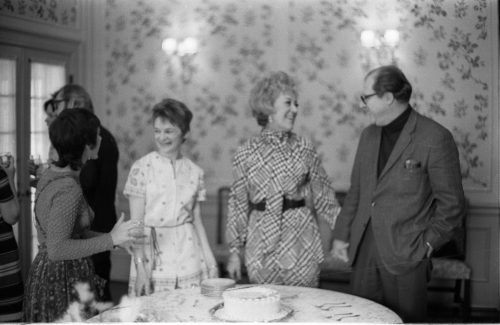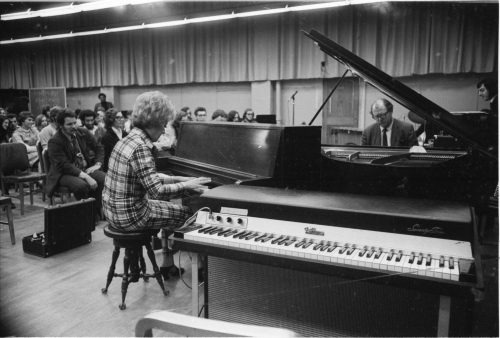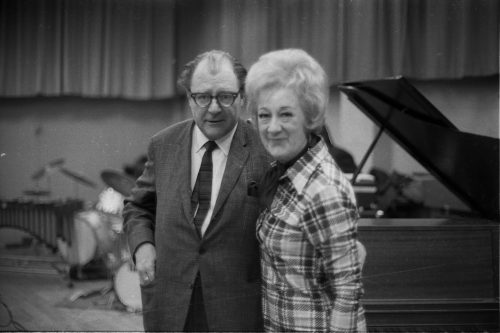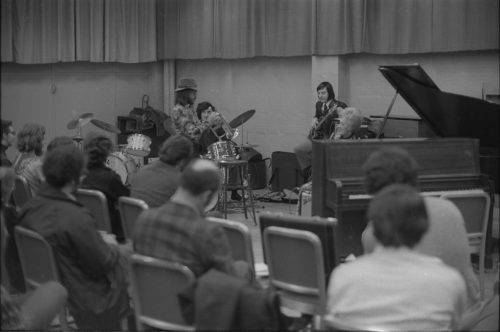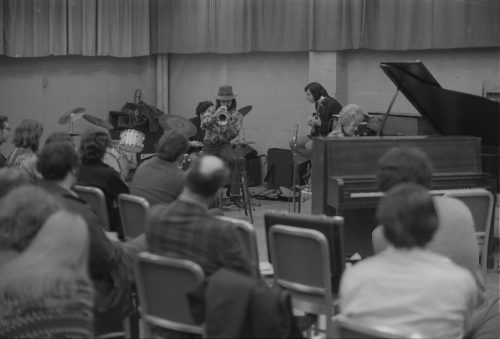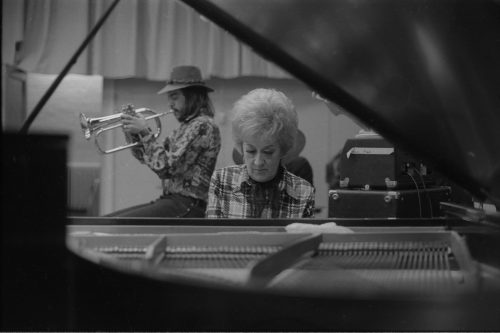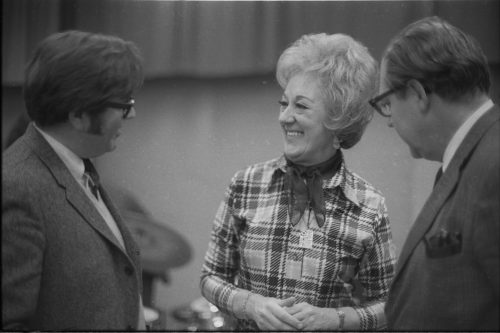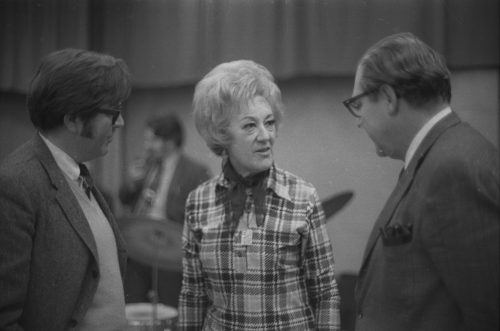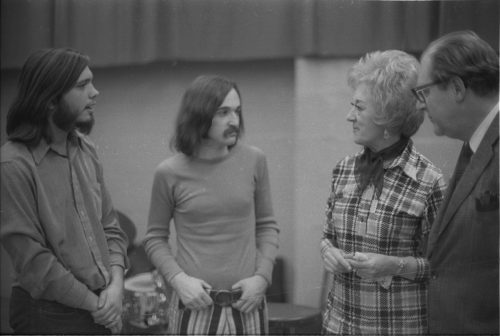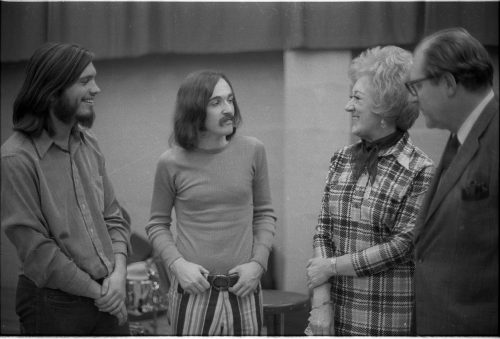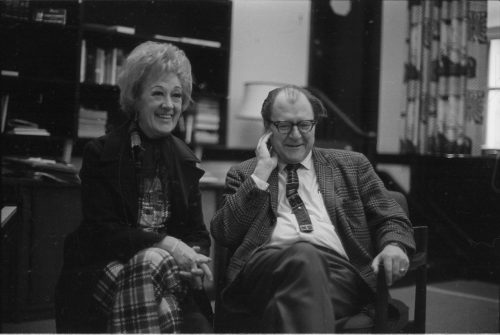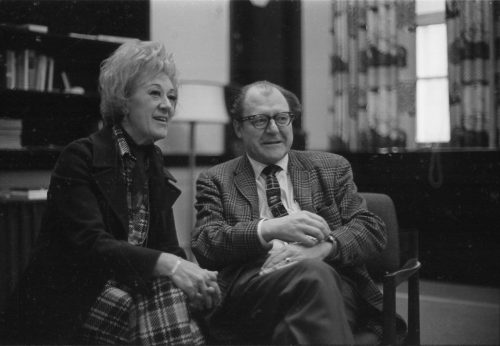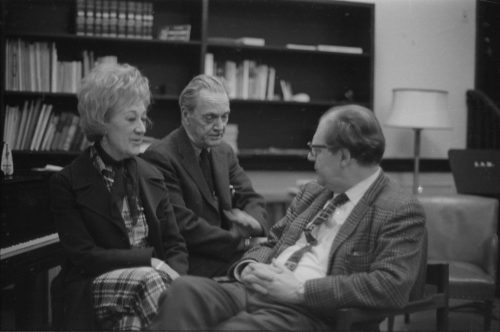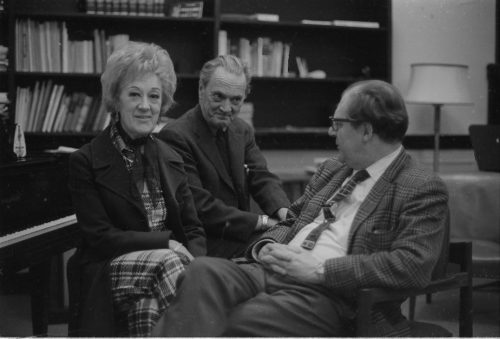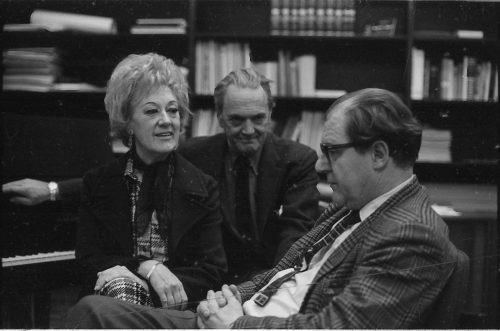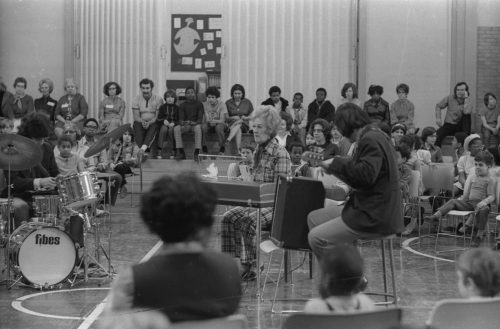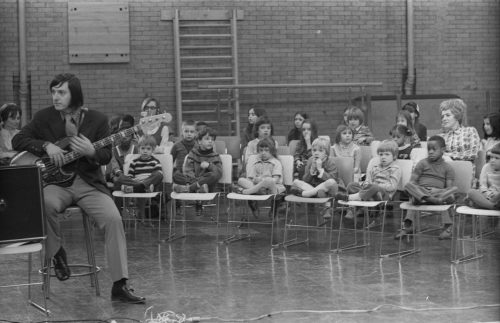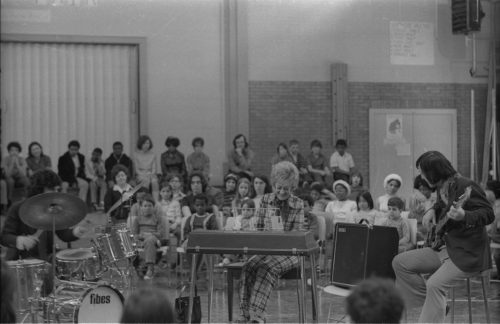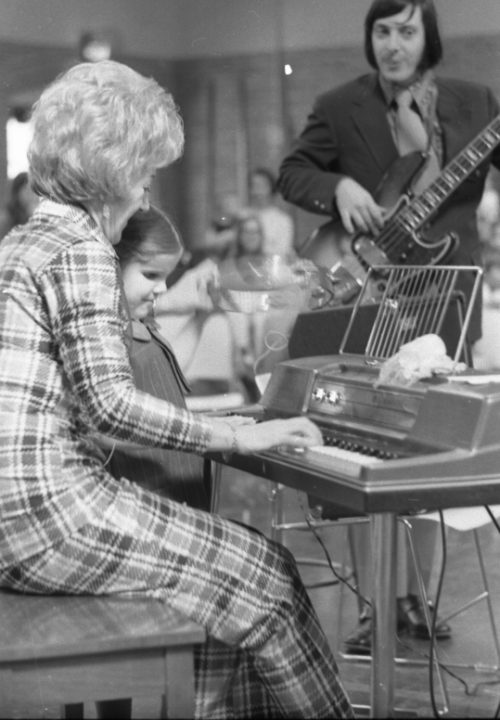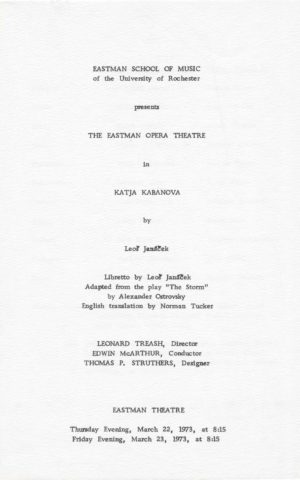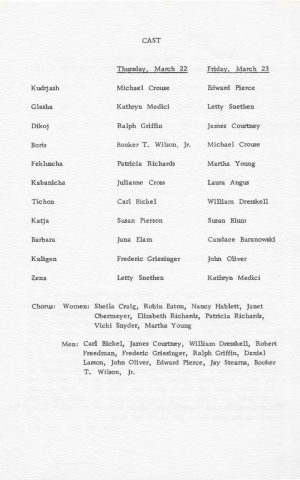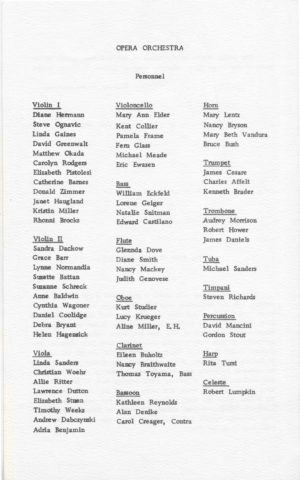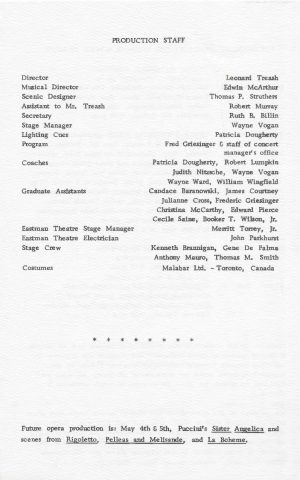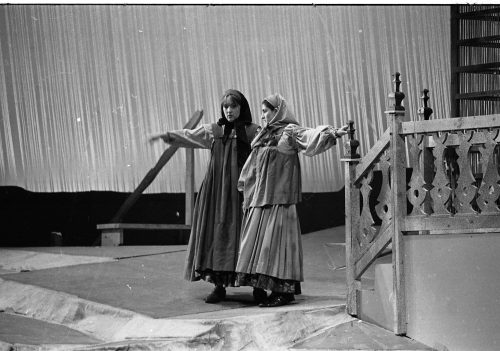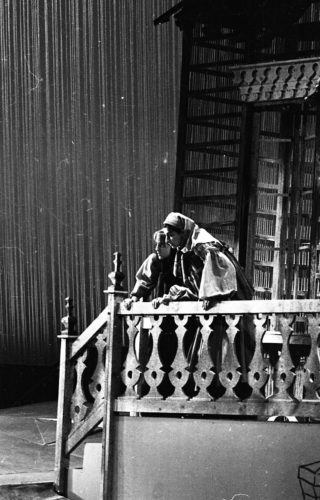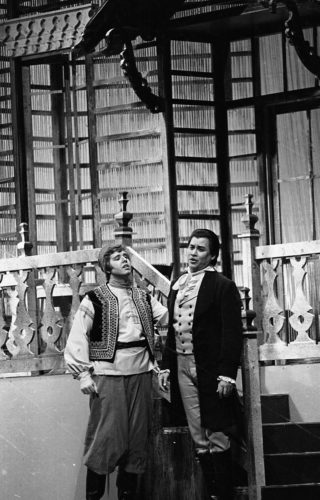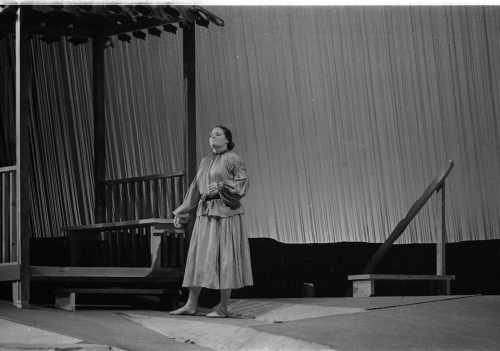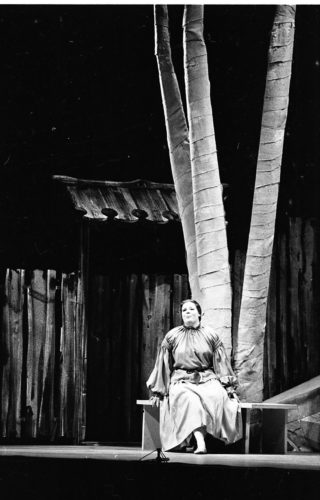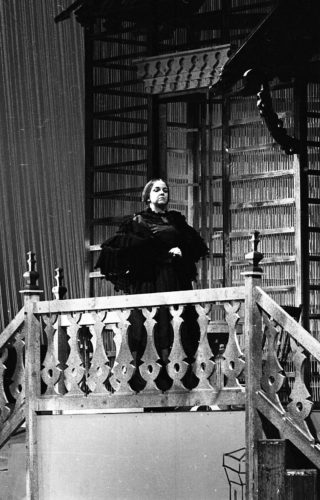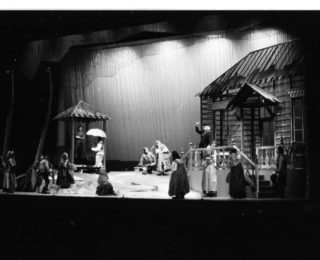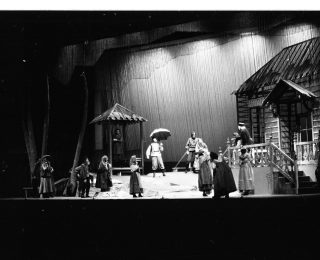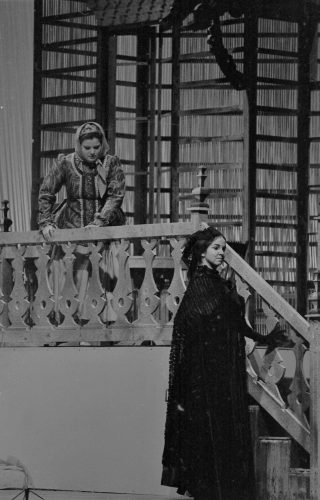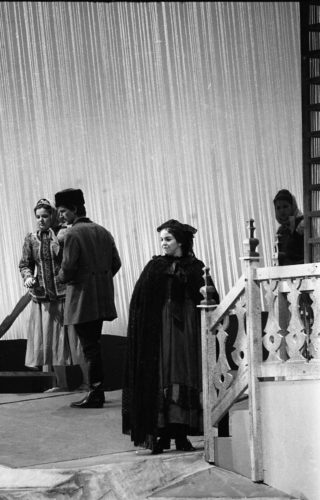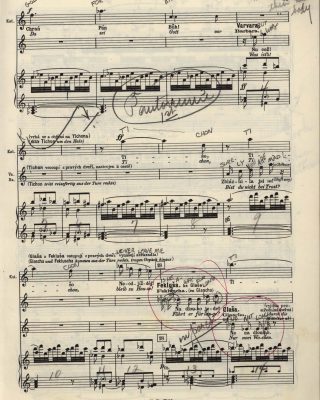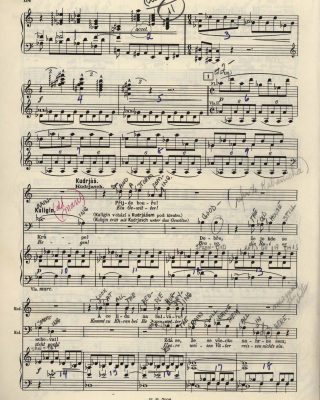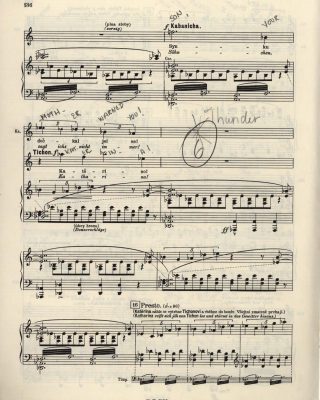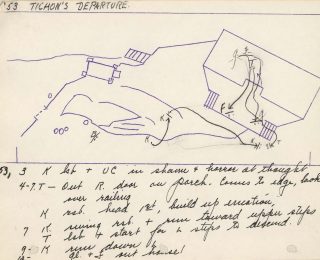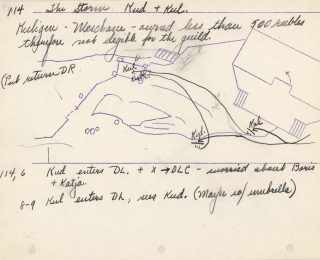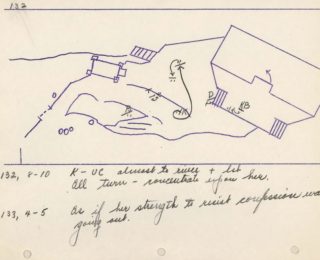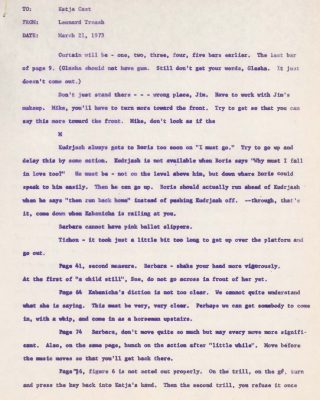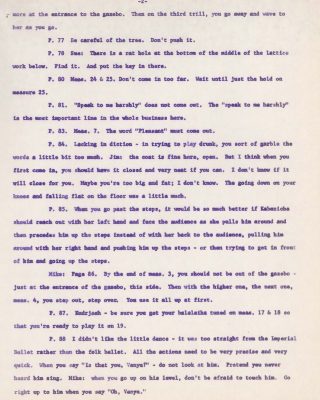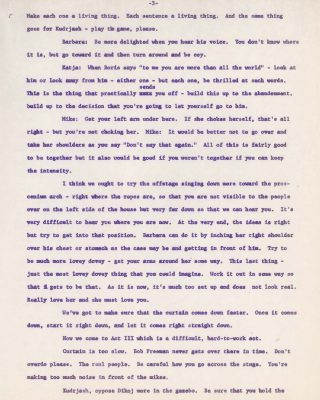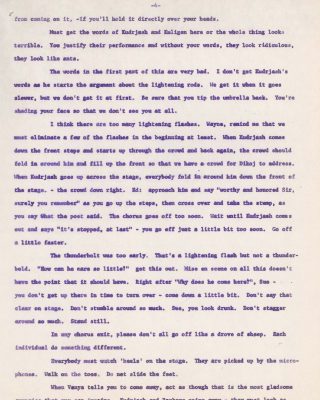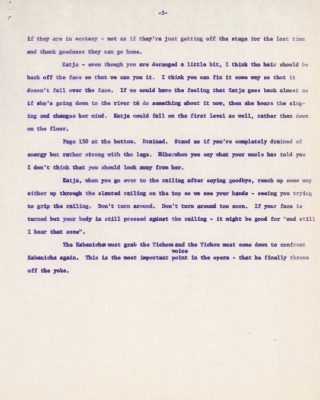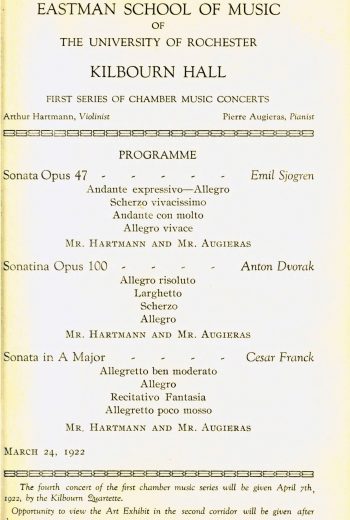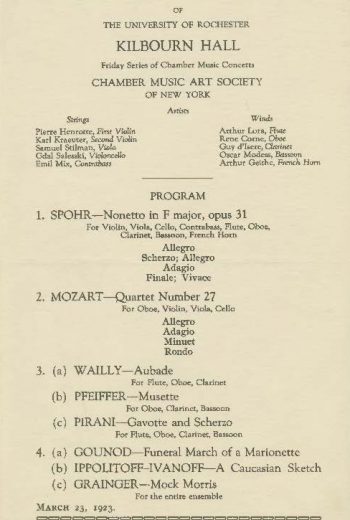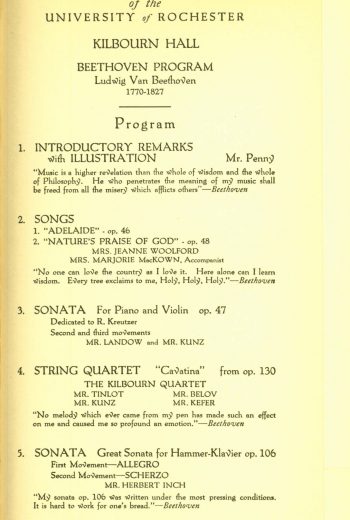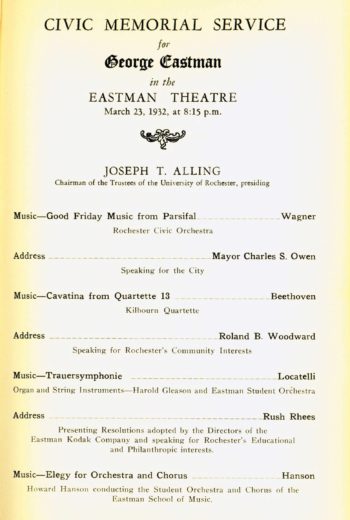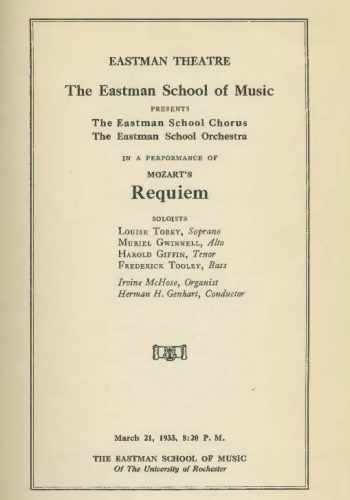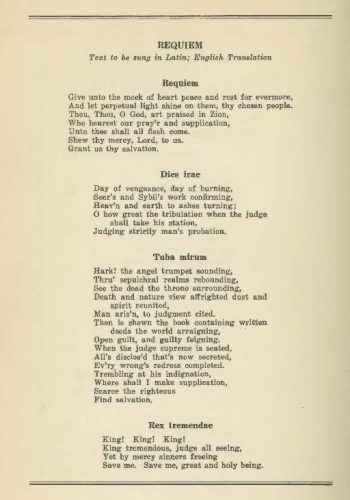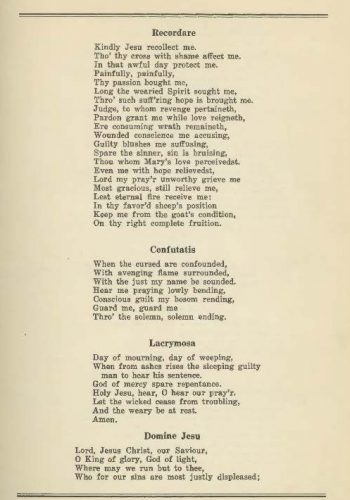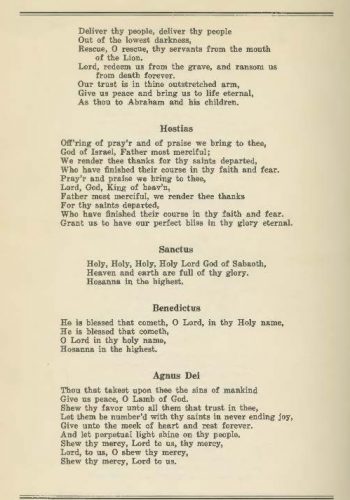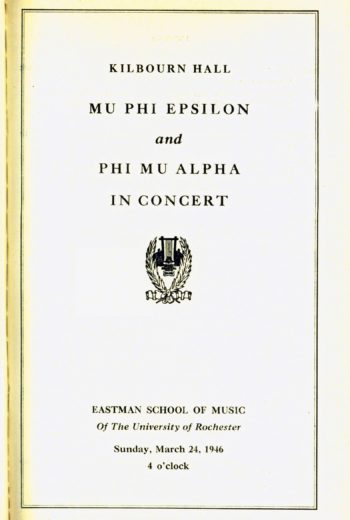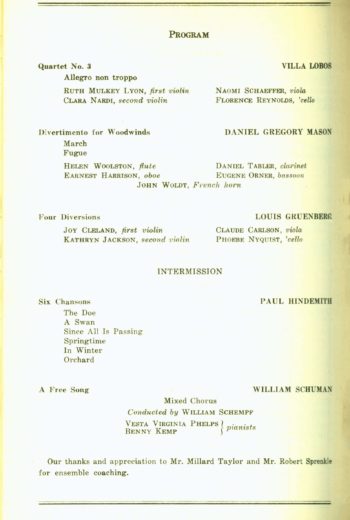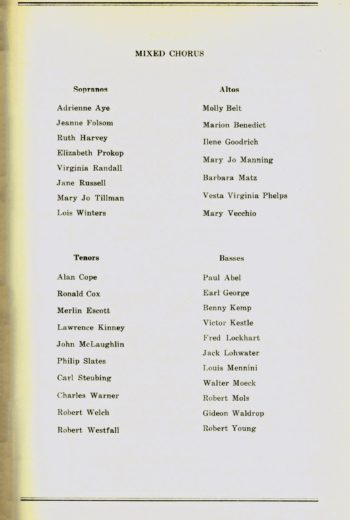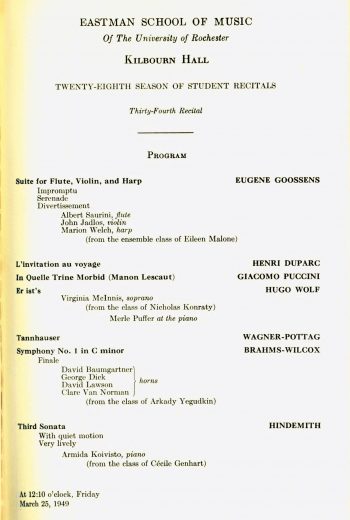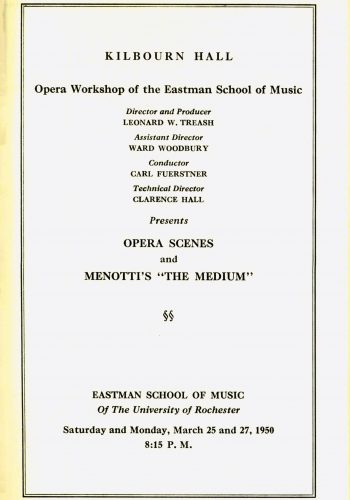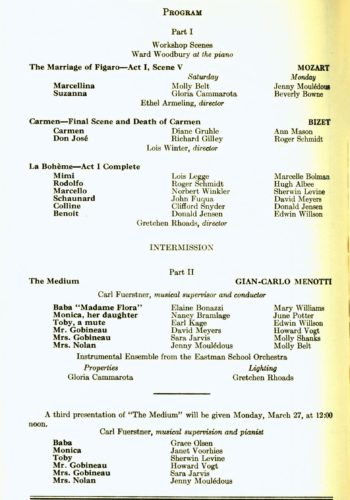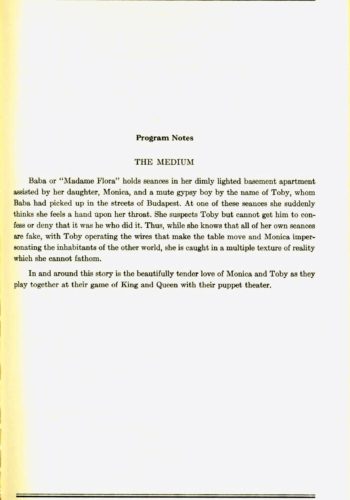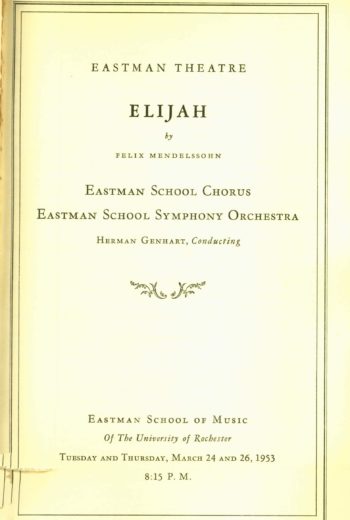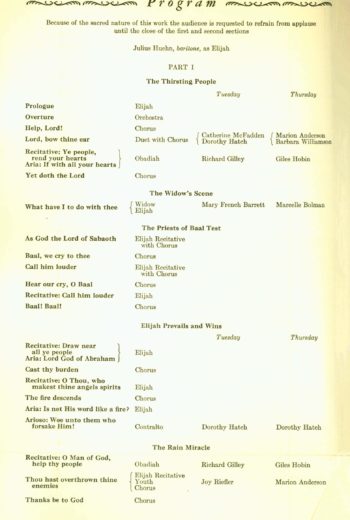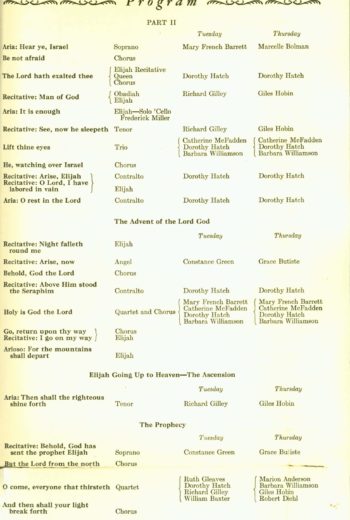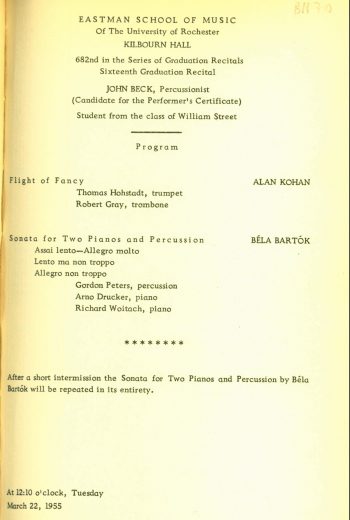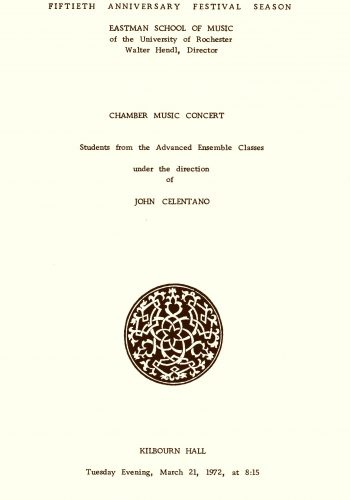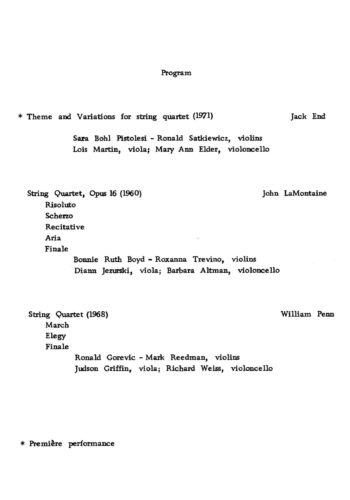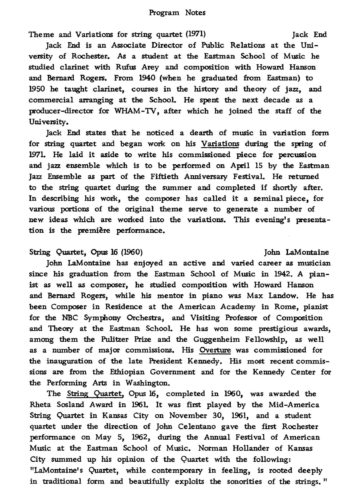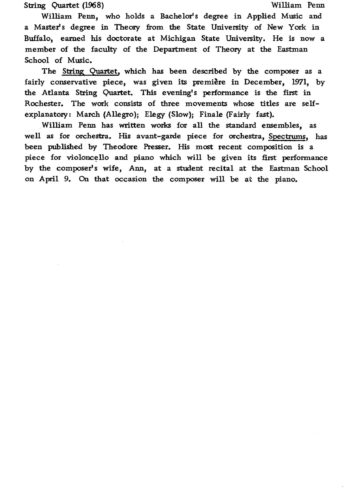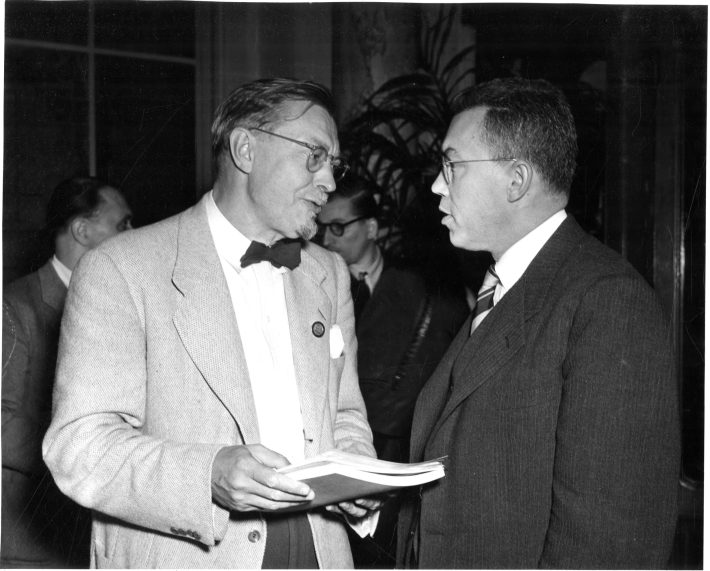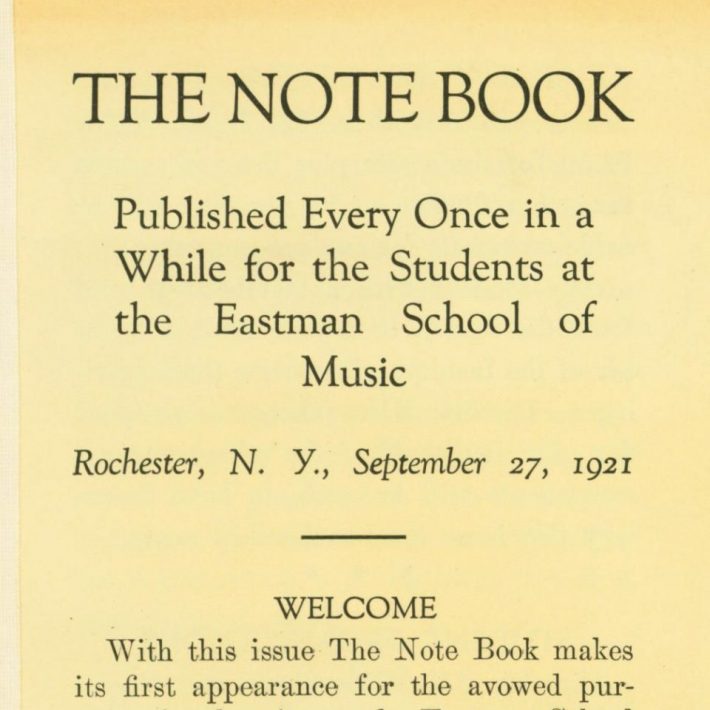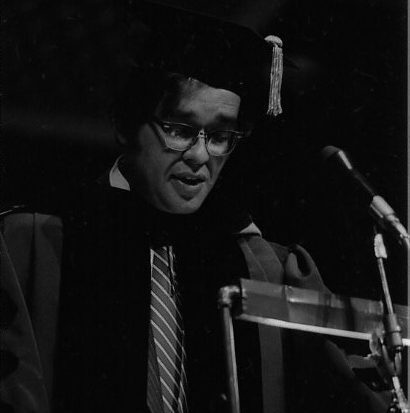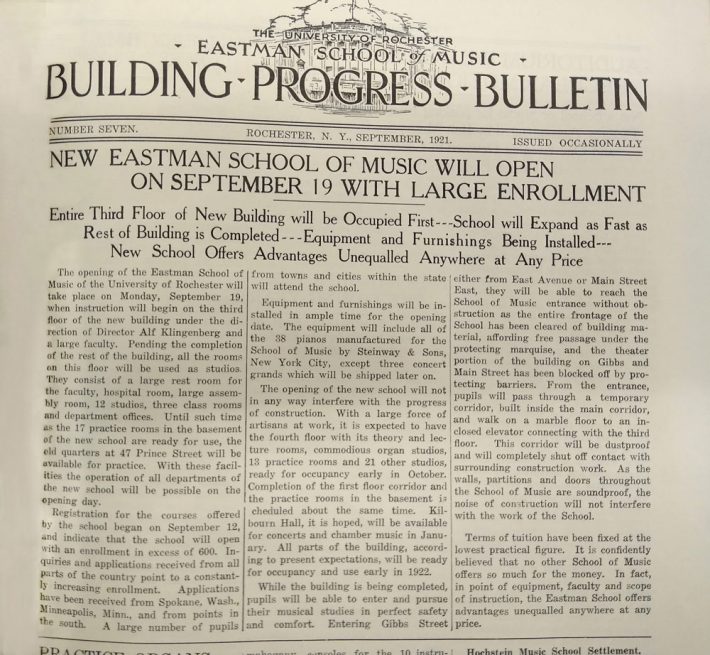1971: Marian McPartland’s first visit to Eastman
Fifty-one years ago this week, on March 23rd, 1971, renowned jazz pianist Marian McPartland played a swingin’ session at the Eastman School of Music, marking her first documented visit to the school.[1] A renowned performer, Ms. McPartland (1918-2013) had discovered jazz through radio programs and recordings while studying music in her native England. Like so many of her compatriots she fulfilled national service during World War II, playing for the troops in Europe; indeed, she had landed at Omaha Beach just one month after D-Day in 1944 together with the first United Service Organizations (USO) performers who landed to perform for the liberating troops in France. That same year she met American jazz cornetist Jimmy McPartland (1907-1991); they were married and then moved to the United States in 1946. Quite apart from her prowess as a performer in her own right, Ms. McPartland won admiration for having been a pioneering woman in jazz, predominantly a man’s world. Her career has been amply covered in countless sources appearing in print, online, and over broadcast media. For more than thirty years she hosted her own National Public Radio-based program Piano Jazz. In March, 2018 the Eastman School celebrated Ms. McPartland’s centennial with a huge evening of jazz in Kodak Hall. For a local perspective on Marian McPartland’s career, I recommend reading Dan Gross’ engaging interview (2018) with Eastman School faculty members Harold Danko (now retired) and Jeff Campbell on the Eastman School website. Ms. McPartland generously left her professional papers to the Sibley Music Library, where the Marian McPartland Collection resides in the Ruth T. Watanabe Special Collections.
Marian McPartland performs on piano before an audience of Eastman School students and faculty members. The session took place in the old orchestra rehearsal space that was in the Annex A. R1176-1A, R1176-4A, R1176-2A.
Marian McPartland jams with members of the Eastman Jazz Ensemble at the Eastman School on March 23rd, 1971. R1180-15A, R1180-16A
I have commented previously in “This Week at Eastman” (entry for the week of October 18th-24th) on Marian McPartland’s Eastman School visit in 1972, when Professor Ray Wright invited her to teach piano improvisation while she was fulfilling a six-week engagement at a Rochester venue. Later this summer, I will have occasion to comment on Ms. McPartland’s guest appearance in the Eastman School’s 1971 Arranger’s Holiday, which was her first of two Arranger’s Holiday appearances. Prior to those two visits, Ms. McPartland made her first documented visit to the Eastman School in March, 1971; with those 1971 and 1972 visits she began a relationship with the Eastman School that would last for the rest of her life. In 2002 the University of Rochester recognized her with an honorary doctoral degree.
An American Federation of Musicians (AFM) contract among Ms. McPartland’s personal paper, signed on October 6th, 1970, indicates that Ms. McPartland and her trio colleagues had been booked for a month-long engagement (March 2nd through 28th) at the Monticello Restaurant at the Rowntowner Motel in Rochester, an establishment formerly located on Jefferson Road in Henrietta. The trio would receive $ 1400 in cash at the end of each week, and would have Mondays off. Accompanying Ms. McPartland to Rochester were drummer Joe Corsello and substitute bass player Rick Petrone (her regular bass player, Mike Moore, had stayed home in NYC for family reasons). No record is extant of the Eastman School’s initial outreach to Ms. McPartland, but it is documented that on the afternoon of Sunday, March 21st, Director Walter Hendl and Mrs. Hendl hosted an informal birthday party for her at their home, Hutchison House, 930 East Avenue. A cake was duly presented to Ms. McPartland, and there was live music; Ms. McPartland played solo for a time, and then played two-piano riffs with Mr. Hendl and then with Margaret Sparrazza of Rochester.[2] (At this time I have no information on Ms. Sparrazza except for one online source indicating that she passed in 2006.) Some photos from the occasion, taken by Louis Ouzer, are displayed here.
On Tuesday, March 23rd, Ms. McPartland and her trio colleagues came to the Eastman School to play for students and faculty members in the orchestra rehearsal hall that was in the old Annex A building. (That building was torn down in the mid-1970s during extensive renovations to the school’s physical plant. One sign of its former existence is visible on the Eastman Theater’s Swan Street-facing exterior wall, where a boarded-up entry/exit signifies where an over-the-street walkway once connected the Eastman Theater to Annex A.) Director Hendl introduced Ms. McPartland to the assembled audience by saying, “Here’s one the greats, and she’s all yours for the next hour.”[3] Much of what we know today of that swingin’ session comes from an article printed in the now-defunct Rochester Times-Union. [4] The trio played for a time and Ms. McPartland also played solo, during which she took requests from listeners. Professor Warren Benson (composition; served 1967-93) requested “Yesterday” by Paul McCartney and John Lennon; Ms. McPartland obliged him with a rendition that joined the song with the song “Yesterdays” by Jerome Kern. Faculty member Chuck Mangione joined Ms. McPartland on his flugelhorn for an improvisation on the song “Green Dolphin Street” by Bronislav Kaper and Ned Washington. Thereafter Mr. Mangione, Director of the Eastman Jazz Ensemble (1968-72), invited several EJE members to take part: vibraphonist Ted Piltzecker, BM ’72; drummer Ted Moore, BM ’73; pianist Joe Galante; flugelhornist Joe Mosello, BM ’71; flutist Gordy Johnson, BM ’74; and trombonist Bill Reichenbach, BM ’71. The group jammed on the number “Comin’ home, baby” for approximately fifteen minutes. For the conclusion to the session, Ms. McPartland was joined by Director Hendl for some two-piano improvising—Mr. Hendl on grand piano, Ms. McPartland on spinet and then on electric piano—improvising on the time-honored standards “Embraceable you”, “Begin the Beguine”, “All the things you are”, “Tea for two”; and “Stardust”. In preparation for the session, the two had practiced together following the Sunday afternoon birthday party at Hutchison House.
Marian McPartland jams with Eastman School faculty member Chuck Mangione on his flugelhorn during the session on March 23rd, 1971.
Marian McPartland with Walter Hendl in conversation with Professor Donald Hunsberger and with two Eastman School students following the swingin’ session on March 23rd, 1971.
Another visitor to Eastman at this time was Ms. McPartland’s close friend, composer-author Alec Wilder (1907-1980), a sometime student of the Eastman School and composer of many popular numbers. The Rochester press had reported that Ms. McPartland and her trio colleagues had been working on Mr. Wilder’s “Jazz Waltz for a friend” which he had composed expressly for Ms. McPartland; Mr. Wilder had made the journey to Rochester specially to hear her.[5] Some shots by photographer Louis Ouzer, capturing Director Hendl visiting with Ms. McPartland and Mr. Wilder in the Director’s Studio, are displayed here.
Marian McPartland and Eastman School Director Walter Hendl visit in the Director’s Studio, joined by composer-writer Alec Wilder. R1179-21, R1179-23, R1179-27, R1179-28, R1179-30.
There was yet a further aspect to Ms. McPartland’s time in Rochester, reflecting one of her most deep-seated interests. Marian McPartland was active in outreach to elementary schools and junior high schools, seeking to connect with students and to acquaint them with jazz. The Rochester press had reported in 1970 that a visit by Ms. McPartland to Rochester’s World of Inquiry School, 46 Moran Street, had had a profound influence on her.[6] On that occasion, during her trio’s month-long March, 1970 engagement at the Monticello Restaurant, Ms. McPartland had visited the school one day on her own; she returned the next day with her trio colleagues to perform for the students. On the following day, she and her colleague bass player Mike Moore visited with students in their classrooms. Ms. McPartland described it as a “unique experience” to see how well students of varying levels of intelligence worked together at the World of Inquiry School, and also to see how innovatively the school was run. She was quoted in the press as having said, “If I had children, I’d love to have them go to that school.” After her 1970 experience at the World of Inquiry School, Ms. McPartland had been moved to elect a music therapy course at New York University in the fall of 1970 so as to gain more ideas to use during school visits. When returning to Rochester in March, 1971, Ms. McPartland made a return visit to the World of Inquiry School together with her trio colleagues; several photos from that visit are displayed here.
Whether it had been Director Hendl’s own decision to invite Marian McPartland to the Eastman School, or whether he had received the suggestion from his faculty, one thing is certain. Mr. Hendl was intent on enabling Eastman School students’ contact with the greats (e.g. “Stravinsky Week” in March, 1966, featured in “This Week at Eastman” in the entry of March 7th/11th). Further, it was during Mr. Hendl’s administration that the department of Jazz Studies and Contemporary Media (such was its original name) had been founded, and also the Eastman Jazz Ensemble (debut in 1967), the Eastman Jazz Lab Band (debut in 1968), and the Eastman Studio Orchestra (debut in 1970). By the early 1970s Jazz had finally come into its own at the Eastman School of Music, and in Marian McPartland, Eastman Jazz would have a very close friend, indeed.
[1] In characterizing the session thus, I am borrowing the terminology used in Notes from Eastman, issue of July, 1971, page 5.
[2] “The lady is blithe spirit.” Rochester Democrat & Chronicle, March 28, 1971. Rochester Scrapbook February-March 1971, page 132. Ruth T. Watanabe Special Collections, Sibley Music Library.
[3] Ibid.
[4] “Marian digs Walter” by Cliff Smith. Rochester Times-Union, March 24, 1971. Marian McPartland Collection, box 118, folder 4; also Rochester Scrapbook February-March 1971, pages 124-125. Ruth T. Watanabe Special Collections, Sibley Music Library.
[5] “Jazz pianist has a shock on arrival” by Cliff Smith. Rochester Times-Union, March 6, 1971. Marian McPartland Collection, box 121, press book 2; and, Rochester Scrapbook February-March 1971, page 62. Ruth T. Watanabe Special Collections, Sibley Music Library.
[6] “Rochester kids still inspire her” by Cliff Smith. Rochester Times-Union, August 22, 1970-. Marian McPartland Collection, box 118, folder 4. Ruth T. Watanabe Special Collections, Sibley Music Library.
1973: Eastman Opera production of Janacek’s Katja Kabanova
Forty-nine years ago this week, Eastman Opera Theater mounted a production of Kátja Kabanová by Leos Janáček, marking the Eastman School’s first and only production of this opera to date. The production was double-cast and was sung in English in the Eastman Theater. The director was Professor Leonard Treash, who served as the Eastman School’s director of opera from 1947 until his retirement in 1976.
A satirical tragedy in three acts, Kátja Kabanová was composed by Janáček (1854-1928) in 1918-21; it was his sixth opera, and he would compose three more operas after this one. The libretto was by Janáček himself, based on the play Гроза (The Storm) by Russian playwright Alexander Ostrovsky (1823-1886). The work of this playwright remains less well-known in the West, although two operas based on plays by him have gained traction in the repertory, those being Katja Kabanova and Rimsky-Korsakov’s Snegurochka (The Snow Maiden). Ostrovsky wrote prolifically and insightfully regarding the merchant class in pre-Revolutionary Russia, a class into which he himself had been born, and this was the social caste portrayed in the play The Storm. In adapting the play for operatic treatment, Janáček compacted the action from the play’s five acts to three while simultaneously preserving intact a substantive extent of the original dialogue.
The printed program for the 1973 Eastman production did not happen to contain a synopsis; perhaps a synopsis was handed out on the evenings of performances; in any event, the synopsis and libretto are amply available online and in printed sources. For the sake of this entry, the action takes place in a small and isolated town on the banks of the Volga in pre-Revolutionary Russia. The heroine, Katja, is trapped in an essentially loveless marriage to Tichon Ivanich, and Tichon’s mother Kabanicha is a brutal, bitter, and controlling presence. Desiring an escape, Katja falls in love with Boris Grigorjevich, but at the opera’s climax, Katja is overcome with guilt and makes a public confession of her adultery, also naming her lover. Unable to compromise with society’s prevailing demands and unable to live with deception, she drowns herself in the Volga. The opera has been interpreted as a conflict between opposing forces, whether seen as light vs. dark, the older generation vs. a younger generation, and other characterizations along the same lines.
In four shots from Act III, we see the storm that inspired the title of Ostrovsky’s play (first two images) and Kabanicha after Katja’s death (last two images).
The opera was premiered in Brno (the composer’s hometown) in 1921; in 1922 it was produced in Cologne; in 1926 in Berlin; and in 1951, the first English production was staged at Sadler’s Wells. The opera was first produced in New York in 1963. In 1973 there was a new English production by English National Opera (successor company to Sadler’s Wells). For the Eastman production, the director’s annotated score and production notes are extant in the Leonard Treash Collection at the Sibley Music Library, and some instances of Director Treash’s work—one of his sets of notes, some sample stage diagrams, and three pages from his annotated vocal score—are displayed here.
Production of Katja Kabanova in 1973 confirms that Eastman Opera Director Leonard Treash (1909-1996) was in no way slowing down in the years immediately preceding his retirement; rather, he was continuing to steer Eastman Opera to break new ground. Serving three decades altogether, from 1947 until 1976, his third decade at Eastman was marked by such productions as Richard Strauss’ Ariadne auf Naxos (1966), Sergei Prokofiev’s The Love for Three Oranges (1969), Francis Poulenc’s Dialogues of the Carmelites (1969, in its first Eastman production), Richard Strauss’ Die Schweigsame Frau (1970), Benjamin Britten’s A Midsummer Night’s Dream (1972), Verdi’s Falstaff (1972 and 1975), Robert Ward’s The Crucible (1973), and Britten’s Albert Herring (1975, in its first Eastman production). Mr. Treash had richly supported Howard Hanson’s American music initiatives by contributing to the Eastman School’s repertory such operas as Burrill Phillips’ Don’t We All and Alberto Bimboni’s In the Name of Culture (both 1949), Douglas Moore’s The Devil and Daniel Webster (1950), Louis Mennini’s The Well (1951), George Antheil’s Volpone (1954), Ron Nelson’s The Birthday of the Infanta (1956 and 1959), Bernard Rogers’ The Nightingale (1957), and Dominick Argento’s The Boor (1957), which Mr. Argento composed during his years of doctoral study at Eastman. In addition, the only full-length production of Howard Hanson’s opera Merry Mount to have been staged at Eastman was directed by Mr. Treash in 1955.
All in all, the Treash years were a rich time for Eastman Opera. The year 2023 will mark Eastman Opera’s centennial, and I will continue to present on past operatic endeavors at the Eastman School as the centennial year continues.
Score extracts.
Three staging diagrams.
Notes from Director Leonard Treash to cast members of Eastman Opera Theater’s production of Opera’s production Kátja Kabanová.
The Weekly Dozen
In this week’s “Weekly Dozen” we recognize one of the earliest chamber music recitals taking place in Kilbourn Hall, this one featuring internationally renowned violinist Arthur Hartmann, who served for one year on the Eastman faculty; the civic memorial service for Mr. George Eastman, which most appropriately was held in the theater bearing his name which he had founded; a performance of opera scenes that also included Eastman Opera’s first-ever production of Gian-Carlo Menotti’s The Medium; a 1972 chamber music recital that featured the premiere performance of a unique work for string quartet by Jack End, the Eastman School’s pioneer in jazz instruction and first Director of the Eastman Jazz Ensemble (1967-68); and some superlative student performances such as grace the Eastman concert calendar each week of the semester.


